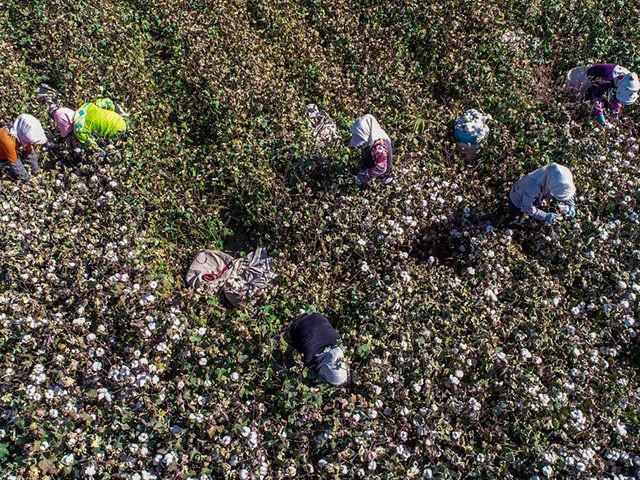China’s state-run Global Times on Tuesday railed at length against the alleged “unilateralism, protectionism, and bullying” of America’s Uyghur Forced Labor Prevention Act (UFLPA) – but also admitted the law is working as intended, even before it officially went into effect on Tuesday.
The UFLPA was passed by Congress and signed into law in December 2021 with a 180-day grace period, so enforcement did not begin until June 21, 2022. The law requires importers to certify their products and supply chains are free from the taint of forced labor in Xinjiang province, where China herded millions of Uyghur Muslims into brutal concentration camps and forced them to work for various industries, notably including Xinjiang’s huge cotton fields.
Analysts for the clothing industry noted that UFLPA sets a high bar for textile manufacturers to clear, so many of them began seeking alternatives to Xinjiang cotton even before the law went into effect. Other international operations with supply chains that stretch through Xinjiang followed suit.
Mixed in with the Global Times’ ranting about the supposed unfairness of punishing China for its abuse of the Uyghurs were several firsthand accounts from Chinese textile industry sources who said orders for Xinjiang cotton are collapsing and finished yarn is piling up in warehouses.
The Chinese Communist paper struggled to reassure its readers that Xinjiang cotton’s woes are only “marginally” affected by UFLPA. Instead, it blamed China’s coronavirus lockdowns, shipping problems, and market price fluctuations for lost cotton sales:
Zhang Jie, who runs a textile plant in Xinjiang and a clothing export company in Shanghai, told the Global Times on Tuesday that the recent epidemic flare-ups in megacities including Shanghai and Beijing sapped Chinese consumers’ purchases of products including clothes, leading to rising clothes stockpiles that reduced manufacturers’ demand for cotton and cotton fabric.
“Raw material exports to third-country markets have also been affected by delayed logistics networks and port congestion, which weighed on upstream chains,” Zhang said, but the situation is expected to improve in the coming months.
On May 30, the Xinjiang regional government held a meeting on promoting the stable and sound development of the cotton industry. The meeting proposed to accelerate the establishment of cotton and yarn transaction centers and digital platforms to enhance the digitalization of the industry, while inducing large textile firms to increase jobs as well as their economic contribution, according to a press release on the local government website.
The Global Times smugly predicted the U.S. ban on Xinjiang cotton would collapse as worldwide cotton prices rise, pressing its point with a huge infographic that emphasized Xinjiang supplied 89.5 percent of China’s cotton last year, so its products are indispensable.
“Other countries couldn’t fill the supply gap,” a Chinese cotton mill owner told the Global Times. Early word from international buyers says that, on the contrary, other cotton suppliers are stepping up and making do without the 20 percent of the worldwide cotton supply produced by Xinjiang might not be that difficult or costly.
Uyghur Human Rights Project (UHRP) Executive Director Omer Kanat said UFLPA implementation was a “huge win” for human rights and predicted other countries would follow the U.S. example.
Kanat’s group and its partners in the Coalition to End Forced Labor in the Uyghur Region called on companies around the world to “end business ties to the Uyghur Region, and ensure they are not sourcing products from workplaces across China where Uyghurs are subject to forced labor and atrocity crimes.”
UHRP also asked international corporations not to “dump goods linked to the Uyghur Region into other markets and to not re-export tainted goods.”
“We have seen the way corporate greed can motivate businesses to go to great lengths to obscure their reliance on forced labor and other unethical practices to create their products,” Kanat said.
“Any company that is truly committed to ending forced labor must implement a single global standard across its supply chain that bans products originating in the Uyghur Region,” he urged.
“We will see if any corporation is brazen enough to take garments or solar panels rejected from the U.S. because they are tainted with forced labor and try to sell those same goods to unsuspecting consumers in the United Kingdom or Japan. The reputational risk would be huge,” said Scott Nova, executive director of the Worker Rights Consortium, another member of the anti-forced labor coalition.

COMMENTS
Please let us know if you're having issues with commenting.